Best Supplements for Erectile Dysfunction: Dietary and Natural Supplements to Boost Performance
Written by Dr. Deepali Anand

Dr. Deepali is a medical writer and healthcare professional with a background in clinical surgery and patient care. Having transitioned from active clinical practice to medical communications, she specializes in bridging the gap between complex clinical data and patient education. Dr. Deepali is dedicated to creating evidence-based content that is grounded in scientific rigor and empathy, ensuring that sensitive topics like sexual wellness and mental health are accessible and empowering for every reader.
•
July 14, 2025
Our experts continually monitor the health and wellness space, and we update our articles when new information becomes available.
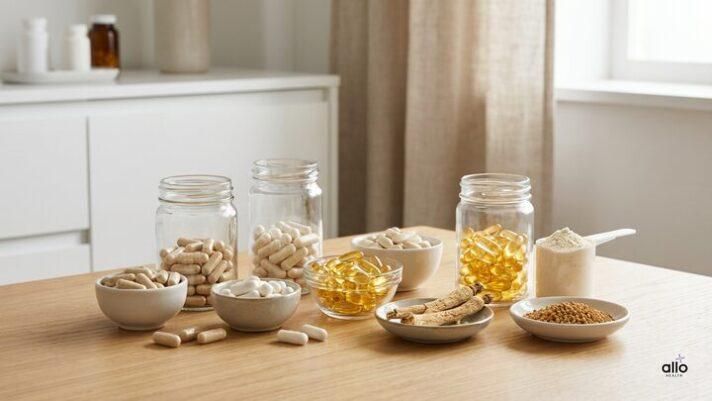
Quick Read
If you're looking for the best supplement for erectile dysfunction, research shows that L-arginine, Panax ginseng, and L-carnitine are the most promising, especially for improving blood flow and supporting overall sexual function. Vitamin D, zinc, and niacin may also help, particularly if you're deficient. However, supplements work best when combined with lifestyle changes like regular exercise, good sleep, and stress management. Always choose high-quality, third-party tested products, and talk to your doctor before starting, especially if you're on medications. Supplements can support your journey, but they’re just one piece of the puzzle.
Looking for the best supplement erectile dysfunction? You're not alone, and you're asking the right question. Many men prefer to start with natural options before considering medications like Viagra, but with so many pills and powders out there, it’s hard to know what actually works.
The truth is, some supplements can support erectile function by improving blood flow, boosting testosterone, or reducing stress, but not all of them are backed by solid science.
In this article, we’ll explore the most effective ED supplements based on current research, explain how they work, and help you separate proven ingredients from overhyped gimmicks.
Allo asks
Have you ever tried supplements to improve erections?
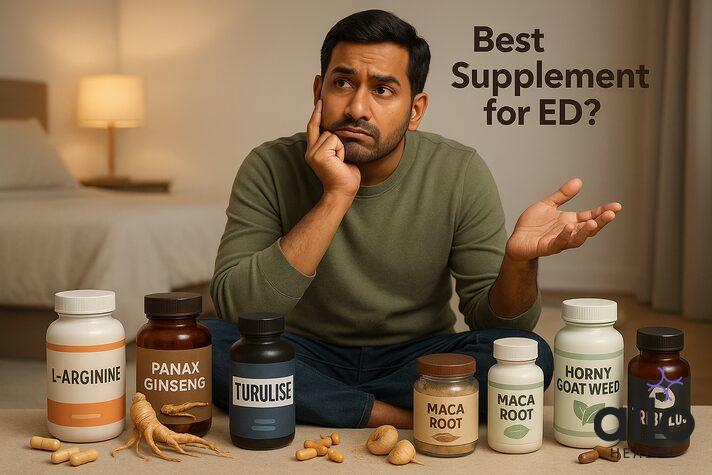
Can Supplements Help With Erectile Dysfunction?
Erectile dysfunction is caused by several different issues, either directly or indirectly. These reasons at the core include three major pathways: the blood flow, the nervous system, and the hormonal imbalance.
Now, do these erectile dysfunction supplements work? Erectile dysfunction supplements are being marketed and used for treating and preventing ED, but there isn't enough evidence to back up their benefits.
They might help prevent and support the ongoing treatment by supporting blood circulation, hormonal imbalances, and stress management, but more research is still needed on it.
Let's find out more about these.
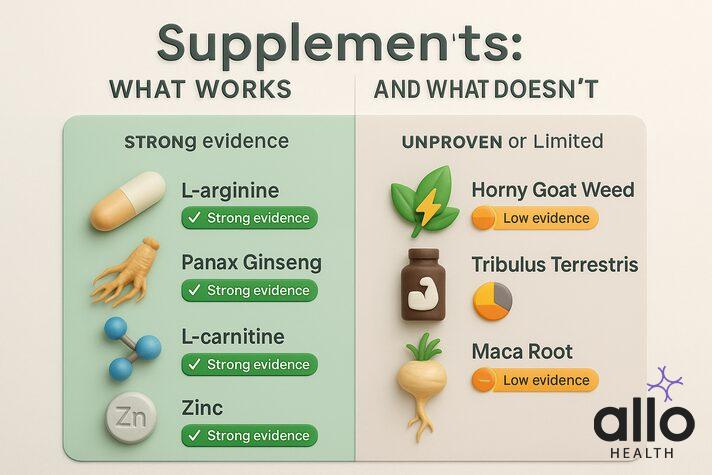
Best Supplements for Erectile Dysfunction (Evidence-Based)
Below are the options with the best overall mix of human research, plausible mechanism, and practical safety notes.
1. L-Arginine
How it works
L-arginine is an amino acid your body uses to make nitric oxide, which relaxes blood vessels and supports healthier blood flow[1]. Better blood flow is very important for stronger erections.
Effective dosage range
- 1,500-5,000 mg daily
- Some studies used 6,000 mg daily for about three months
Common Side Effects
- Stomach upset, nausea
- Low blood pressure (lightheadedness)
- Headache
- Possible changes in blood sugar or potassium
Precautions
- L-arginine use for ED can lower blood pressure further when combined with BP medicines or prescription ED drugs.
- People with heart disease should talk to a doctor before using.
2. L-Citrulline
How it works
L-citrulline is another amino acid that your body converts into L-arginine, which then supports nitric oxide[2]. Many people tolerate L-citrulline for ED well, and it may be a more “steady” way to support nitric oxide levels.
Effective dosage range
- 1,500-3,000 mg daily
- Often taken once daily or split into two doses.
Common Side Effects
- Mild stomach upset
- Occasional headache
Precautions
- Avoid unsupervised use if taking nitrate medicines or multiple blood pressure drugs.
3. Ginseng (Panax Ginseng)
How it works
- Enhancing nitric oxide activity (supports blood flow)
- Reducing fatigue and stress (helpful when stress contributes to ED)
Effective dosage range
- 200-1,000 mg daily, commonly split into 2 doses
Common Side Effects
- Insomnia (especially if taken late)
- Headache
- Digestive discomfort
Precautions
- Can interact with blood thinners (like warfarin) and some medications affecting blood sugar or blood pressure.
- Avoid if sleep is already poor unless dosing is carefully timed earlier in the day.
4. L-Carnitine
How it works
L-carnitine can benefit ED as it supports energy production and blood vessel health. Some studies show the benefits of L-carnitine in men with blood circulation or metabolic issues[4]. It may also support recovery after prostate surgery.
Effective dosage range
- Around 1,500 mg daily
Common Side Effects
- Nausea, stomach upset
- “Fishy” body odor in some people (a known carnitine effect)
Precautions
- People with a history of seizures should consult a doctor before use.
- Works best when paired with broader lifestyle changes (diet, activity, sleep).
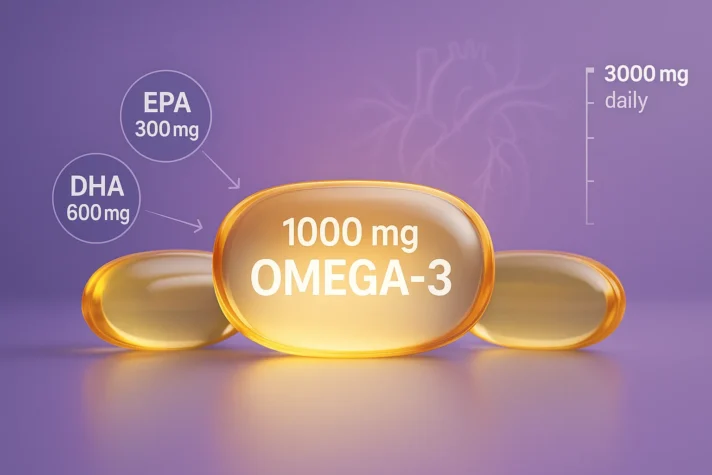
5. Omega-3 Fatty Acids
How it works
Omega-3s support cardiovascular health, balance inflammation, and blood vessel function[5]. Since erections depend heavily on healthy blood vessels, omega-3s support erectile function indirectly.
Effective dosage range
- 1,000–2,000 mg of combined EPA and DHA daily
Common Side Effects
- Fishy burps, mild reflux
- Stomach upset
Precautions
- Higher doses increase bleeding risk when combined with blood thinners.
6. Zinc
How it works
Zinc can help with ED by supporting testosterone production and reproductive health, but this helps when zinc deficiency is present[6].
Effective dosage range
- 15-30 mg daily
Common Side Effects
- Nausea (especially on an empty stomach)
Precautions
- Long-term high-dose zinc can interfere with copper and other nutrients.
- If using zinc for more than a few weeks, keep the dose reasonable.
7. Vitamin D
How it works
Vitamin D supports blood vessel health, testosterone production, and nitric oxide activity. Low vitamin D levels often appear in men with ED, and correcting this deficiency may improve erectile function[7].
Effective dosage range
- 1,000-2,000 IU daily for most people
Common Side Effects
- Usually none at normal doses
Precautions
- Vitamin D can be harmful in excess. If taking higher doses, monitor levels.
8. Ashwagandha
How it works
Ashwagandha reduces stress and supports sleep quality. Ashwagandha may help ED when anxiety, fatigue, or low libido contribute to it. But it does not directly increase blood flow[8].
Effective dosage range
- Often 300-600 mg/day of a standardized root extract (varies by formulation)
Common Side Effects
- Drowsiness
- Stomach upset
Precautions
- Use caution with thyroid issues or sedative medications.
- Use caution with thyroid disorders or sedative medicines.
9. Fenugreek
How it works
Fenugreek has been studied more for libido and perceived sexual well-being than purely for fenugreek's effect on erections[9]. It may help some men with:
- Libido
- Energy and confidence
- Possibly mild hormonal support
Effective dosage range
- Common ranges vary widely by extract type (often 500-600 mg/day of standardized extract)
Common Side Effects
- Gas, bloating
- Maple-like body odor (can happen)
Precautions
- It can affect blood sugar. If diabetic or on glucose-lowering meds, monitor closely.
10. Niacin (B3)
How it works
Niacin improves cholesterol and blood vessel function. These effects of niacin may help with erections in men with high cholesterol[10]. Evidence supports select use, not routine use.
Effective dosage range
- Varies by form and medical need
Common Side Effects
- Flushing
- Itching
Precautions
High doses of stress the liver and require medical supervision.
11. Folic Acid (B9)
How it works
Folate supports nitric oxide production and blood vessel health. Low folate levels correlate with poorer erectile function.[11] Benefits improve when paired with other vascular support.
Effective dosage range
- 400–800 mcg daily
Common Side Effects
- Usually well-tolerated
Precautions
- High doses can mask vitamin B12 deficiency.
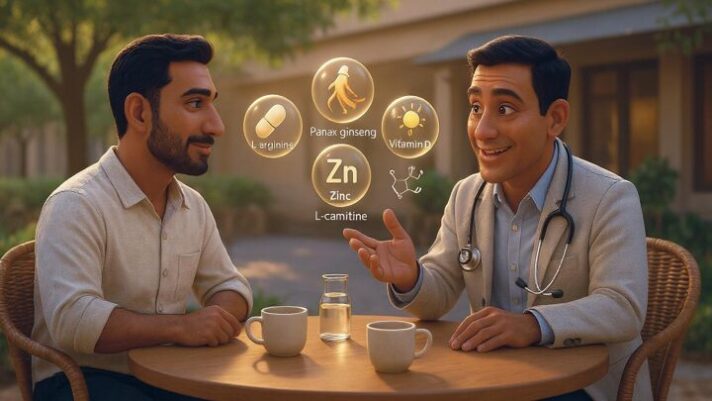
Limited Evidence Supplements for Erectile Dysfunction
These have some promise, but the research is smaller, mixed, or carries bigger safety concerns.
1. Tongkat Ali (Eurycoma longifolia)
Small studies show mixed results. Some men report benefits, but evidence remains weak.
2. Yohimbe/Yohimbine
Some evidence exists, but side effects can be serious: anxiety, increased heart rate, high blood pressure, panic symptoms, and medication interactions.
3. DHEA (Dehydroepiandrosterone)
DHEA declines with age, and supplementation may help some older men, but results are inconsistent.[12]
Popular but Unproven Supplements for Erectile Dysfunction
These are common in marketing, but human evidence for ED improvement is weak or inconsistent.
1. Horny Goat Weed (Epimedium)
Most research is animal or lab-based. Real-world human ED data is limited.
2. Tribulus Terrestris
Popular in bodybuilding circles, but it doesn’t consistently raise testosterone in healthy men and lacks strong ED evidence.
3. Maca Root
Maca root may help sexual desire in some people, but maca roots' evidence for erection quality specifically is thin.
Supplements to Avoid for ED
1. Unsafe or unregulated pills
Anything sold as “instant” or “guaranteed” often comes with quality risks.
2. Hidden steroids or sildenafil-like substances
Some products have been found to contain undisclosed drug-like ingredients (including PDE5 inhibitor analogs), which can be dangerous.
3. Why “Herbal Viagra” is risky
Sold as natural remedies, you may unknowingly take a drug-like compound that affects blood pressure and heart medications, without any proper dosing or safety controls.
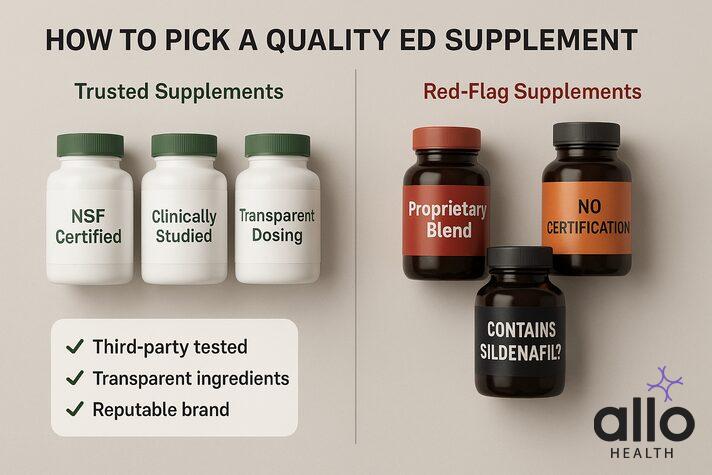
How to Choose the Right Supplement
Look for certified, lab-tested brands
- Prefer third-party testing (examples: USP, NSF)
- Transparent labeling and dosage
Ingredients to check
- Standardized extracts (especially for herbs)
- Clear active ingredients
Red flags in ED supplements
- “Works in 30 minutes,” claims
- No dosage listed
- Only sold via sketchy marketplaces
- Aggressive marketing with no real evidence
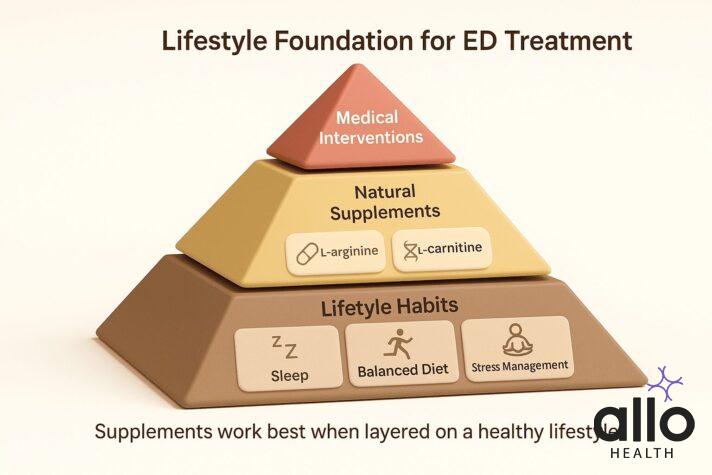
Beyond Supplements: Improving Erectile Function Naturally
Supplements work best as part of a bigger plan, not as quick fixes. Your daily habits can either support or sabotage your sexual health. In many cases, improving these areas not only boosts supplement effectiveness but may even reduce the need for them.
- Exercise and pelvic floor exercises improve blood flow and confidence
- A balanced diet supports heart and blood vessel health
- Better sleep stabilizes hormones
- Stress reduction improves nerve response
- Limiting smoking and alcohol protects circulation
Safety First: What You Need to Know
Drug Interactions
Be careful with supplements if taking medications for:
- Blood pressure
- Heart disease
- Diabetes
- Mood disorders
For eg, L-arginine plus BP meds may lower BP too much, ginseng can interact with blood thinners, and yohimbine can interact dangerously with antidepressants.
Supplement Quality
Supplements are not regulated like prescription drugs. Choose reputable, tested products and avoid “miracle” blends.
Before starting any ED supplement, especially if you're on medication, have a quick chat with your doctor. A little precaution can go a long way.
When Supplements Are Not Enough
Signs of underlying medical conditions
- ED plus chest pain, breathlessness, leg pain with walking
- ED with numbness, nerve symptoms, or major stress symptoms
- ED with persistent low libido and fatigue
When to Consider Medical Treatment
If no meaningful improvement after 3-6 months of consistent effort, or if symptoms worsen.
Importance of a Proper Diagnosis
ED can be an early warning sign of cardiovascular disease, diabetes, or hormonal issues. A simple check-up can save a lot of time and worry.
Your Action Plan: Starting Smart
- Choose certified brands
- Start one supplement at a time
- Begin with low doses
- Track results for 4-12 weeks
- Stay consistent
- Reassess after 2-3 months
If someone searches for the best supplement erectile dysfunction options, success depends on matching the supplement to the cause. The best supplement for erectile dysfunction supports blood flow, fits the person’s health profile, and works alongside healthy habits.
Moving Forward with Confidence
ED is common, and it is treatable. Evidence-backed options like L-arginine, L-citrulline, ginseng, and L-carnitine can support erections for some men, especially when paired with healthier daily habits. Just keep expectations realistic: these are supportive tools, not guaranteed cures.
And if you ever feel stuck, that’s not failure. It’s simply a sign that it is time to widen the plan, whether that means medical evaluation from a healthcare provider, prescription medicines, or addressing stress and sleep more seriously.
Disclaimer
The following blog article discusses alternative medicine practices and their potential effects or benefits. However, it is important to note that the information provided is for general educational purposes only and should not be considered as medical advice or a substitute for professional guidance from a qualified healthcare professional. Before considering any alternative medicine practices or treatments, it is recommended to consult with a healthcare professional. Alternative medicine encompasses a wide range of practices that may not have undergone rigorous scientific evaluation or received widespread acceptance within the medical community. The effectiveness, safety, and appropriateness of alternative medicine practices can vary significantly depending on the individual, their specific medical conditions, and other factors. It is important to approach alternative medicine practices with caution and skepticism. Some practices may carry potential risks or interact with existing medical treatments. A healthcare professional can provide guidance based on your medical history, evaluate the available evidence, and offer informed advice regarding the potential benefits and risks of alternative medicine practices. Individuals with specific medical conditions, allergies, or taking medications should exercise particular caution when considering alternative medicine practices. Some practices may have contraindications or adverse effects, and it is essential to discuss these potential concerns with a healthcare professional before pursuing any alternative treatments.
Most Asked Questions
Do supplements permanently cure ED?
No. Supplements do not permanently cure erectile dysfunction. They may support erections by improving blood flow, lowering stress, or correcting deficiencies. If ED has a medical cause, supplements alone are unlikely to fix it.
Can I take supplements with ED medicines?
Sometimes, but caution is important. Supplements like L-arginine or ginseng can lower blood pressure and may increase side effects when combined with ED medicines. Always check with a doctor before combining them.
Is L-arginine better than L-citrulline for ED?
Neither is clearly better for everyone. L-arginine works directly but may cause stomach upset. L-citrulline converts into L-arginine and is often easier to tolerate. Both can support blood flow when used correctly.
Do vitamins help erectile dysfunction?
Vitamins help mainly when a deficiency exists. Vitamin D, zinc, and folate support blood vessel and hormone health. Taking extra vitamins without a deficiency usually does not improve erections.
Are Ayurvedic supplements effective?
Some Ayurvedic ingredients may support stress, energy, or libido. Strong evidence for improving erection quality is limited. Product quality varies, so choose tested brands and avoid exaggerated claims.
Which product is best for erectile dysfunction?
There is no single best product. The best supplement for erectile dysfunction depends on the cause, such as blood flow issues, stress, or nutrient deficiency. Evidence-backed options work best when matched to the right need.
Are ED supplements safe to use with prescription medications?
Not always. Many erectile dysfunction supplements interact with blood pressure, heart, diabetes, or mood medicines. Some products contain hidden drug-like ingredients. Always review supplements with a healthcare professional.
How long do ED supplements take to work?
Most supplements need time. Some men notice changes in 4–6 weeks, while others need up to 3 months. Consistent use and healthy habits strongly affect results.
Sources
- 1.
The Potential Role of Arginine Supplements on Erectile Dysfunction: A Systemic Review and Meta-Analysis
- 2.
Carnitine
- 3.
Ginseng for erectile dysfunction
- 4.
The bright and the dark sides of L-carnitine supplementation: a systematic review
- 5.
Omega-3 Supplements and Cardiovascular Diseases
- 6.
Zinc is an Essential Element for Male Fertility: A Review of Zn Roles in Men’s Health, Germination, Sperm Quality, and Fertilization
- 7.
Vitamin D and Male Erectile Function: An Updated Review
- 8.
Efficacy of Ashwagandha (Withania somnifera Dunal. Linn.) in the management of psychogenic erectile dysfunction
- 9.
Beneficial effects of fenugreek glycoside supplementation in male subjects during resistance training: A randomized controlled pilot study
- 10.
Effect of niacin on erectile function in men suffering erectile dysfunction and dyslipidemia
- 11.
Role of folic acid in nitric oxide bioavailability and vascular endothelial function
- 12.
Dehydroepiandrosterone and Erectile Function: A Review


